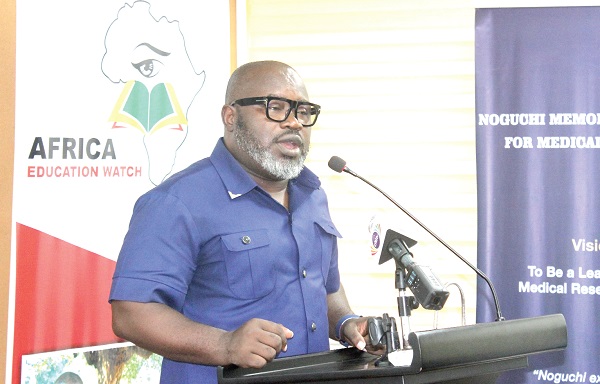
Restore budget cuts to basic education — Eduwatch
The government has been urged to review the medium-term expenditure framework to restore all budget line cuts in basic education in the 2023 budget.
The Executive Director of Education Watch (Eduwatch), Kofi Asare, who made the call, said the review should be captured in the supplementary budget to be presented to be read this year.
Failure to do so, he said, would have dire consequences in terms of funding for basic education.
Delivering a presentation at a roundtable on Ghana's IMF programme and its implications on public basic education yesterday in Accra, Mr Asare said the programme was already having a bite on basic school education which needed to be looked at before it became too late for the country to redeem itself from the consequences.
He said the 2023 budget was the country’s inception budget into the IMF programme and therefore was dictated by the conditionalities of expenditure cuts in the education sector.
"For the first time in two decades, only 12.9 per cent of budgeted expenditure was allocated to education, far below UNESCO’s 15 per cent minimum benchmark. Also only three per cent of GDP was allocated which is below UNESCO’s four per cent minimum benchmark,” he stated.
![]()
Capping of GETFund
The Education Watch boss said, in December 21, 2022, the Ministry of Finance secured a parliamentary amendment to Act 974, to further '”tighten the cap” on GETFund and the other earmarked funds from 25 per cent to 17.5 per cent of receivables.
He noted that the strict application of the amended Act 974 could see up to 80 per cent of GETFund levy accruals diverted for budgetary support in other sectors.
The implication, he said, was that the GETFund could not create the fiscal space to adequately fund infrastructure interventions for enrolling and retaining children in formal basic schools, as 2,000 schools were needed to absorb one million schoolchildren, and deal with over 5,000 basic schools under trees and sheds, among other challenges.
On the effect of the IMF programme on quality basic education, Mr Asare said the goods and services budget line to basic education from which the Capitation Grant, Basic Education Certificate Examination (BECE) subsidy, feeding grants to special schools were financed, had seen a decline from GH¢ 292 million in 2022 to GH¢167 million in the 2023 budget.
“Out of about GH¢80 million required for the Capitation Grant in 2023, only GH¢ 11 million was budgeted.
Denying public basic schools the required resources can lead to the imposition of hidden fees, a situation already prevailing in many public basic schools,” he said.
Touching on the effect of the IMF programme on teacher deployment, the executive director indicated that with a freeze on public sector employment in the 2023 budget, only a maximum of 8,000 teaching and non-teaching staff may be recruited in the pre-tertiary sector in 2023 against an average of 15,000 yearly.
That, he said, could leave an annual teacher deficit of about 7,000.
Mr Asare noted that as the economy grew within the IMF period of 2023-2025, fewer resources would be committed proportionally to education.
School feeding programme
For the school feeding programme, Mr Asare said the 2022 budget’s target to increase the number of beneficiaries to four million did not materialise due to expenditure cuts.
He said austerity periods including the IMF's medium-term programme was occasioned by an increase in taxation, affecting the poor negatively, hence the need to cushion them with programmes such as the school feeding, stating that 969 million was allocated for 2023 and 2024, which suggests no new beneficiaries would be added to the programme.
"The 2025 situation looks more dire with a 23.5 decline in the expenditure allocation to GH¢ 774,200,000,” he stated.
Unanimity
Other panel members who contributed to the discussions included the Coordinator, Economic Governance Platform, Abdulkarim Mohammed; the Greater Accra Regional Secretary of the National Association of Graduate Teachers (NAGRAT), Richard Kwashie Koves, and the Senior Economic Analyst of the Natural Resource Governance Institute (NRGI), Dr Alex Ampaabeng.
They were unanimous that throughout the years, various IMF programmes had not helped the country to deal with its economic issues.
They called for a merger of some ministries to reduce national expenditure.

